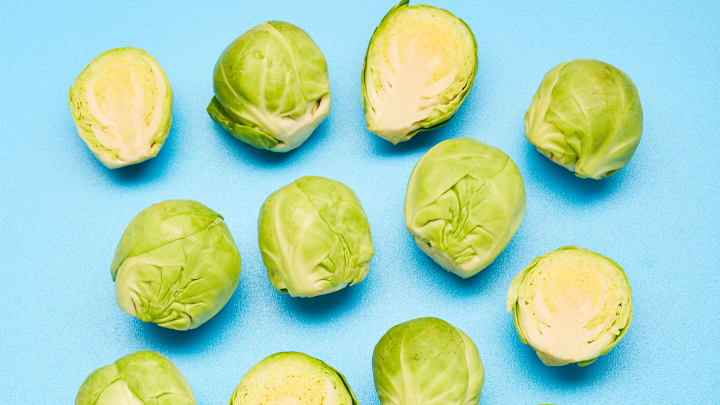The fourth season of Leave It to Beaver opens with a haunting line: “Beaver, eat your Brussels sprouts.”
The directive comes from Mrs. Cleaver, who then spends most of the episode trying to gently steer her son into compliance using every disciplinary trick in the book. He finally chokes down a sprout thanks to a well-timed slap on the back from big brother Wally, and walks away from the whole affair having learned a valuable lesson: Parents nag because they care.
As for Beaver’s newfound appreciation for the diminutive buds themselves, it stops short at “I think it’s gonna stay down there”—in other words, “I like this enough not to involuntarily puke it back up.”
Childhood aversion to vegetables—and Brussels sprouts in particular—is such a familiar TV trope that Beaver’s plight may elicit a nostalgic twinge even if you never had an issue housing a helping of them yourself. Or maybe you did, and you just assumed you outgrew the problem as your palate grew more refined.
But there’s more to the story than untried taste buds: Brussels sprouts really did used to taste worse.
The Bitter Truth
“In the late 1960s, our industry switched over to mechanized harvesting, which required a plant that would mature fairly evenly over the entire stem,” Brussels sprouts farmer Steve Bontadelli told MEL Magazine in 2021. The best sprouts for the job came at a cost: They were “horribly bitter,” he explained, “and we turned off an entire generation.”

Anti-sprout sentiment began to dissipate in the 1990s, largely because the sprouts themselves became less bitter. As NPR reports, a group of Dutch biotechnologists led by Hans van Doorn pinpointed the chemical compounds behind the sprout’s characteristic bite—a couple of glucosinolates called sinigrin and progoitrin.
After trawling their stores for old seeds that were low in those potent compounds, Dutch seed suppliers embarked on a years-long mission to breed the ideal plant: one that would turn out not-too-bitter Brussels sprouts, and do so quickly enough to keep up with modern production standards. Their success helped catapult the once-maligned vegetable to culinary stardom, especially in the U.S.
A New Hot Take
Culinary celebrities helped, too—like Momofuku’s David Chang, whose Brussels sprouts with kimchi purée and bacon inspired other chefs to think outside the box. The 1990s also saw the rise of the Food Network, giving viewers at home a behind-the-scenes look at how to make Brussels sprouts and other polarizing veggies actually taste good.
That magic typically involved oven-roasting, which had finally started to supplant boiling as Western culture’s de facto method of vegetable preparation. Why it took so long to catch on, as Slate’s J. Bryan Lowder explained in 2014, was partly due to the long-held belief that ovens were mainly intended for bread and other baked goods (plus the occasional meat), while veggies stayed on the stovetop. Popular cookbooks like Joy of Cooking and The Fannie Farmer Cookbook reinforced this separation by advising boiling, steaming, and sauteing for vegetables.
According to Lowder, chefs Johanne Killeen and George Germon led the charge to make oven-roasting a thing pretty much by accident: When they opened their restaurant, Al Forno, in Providence, Rhode Island, in 1980, it only had an oven. Using it to roast vegetables worked out so well that they simply never stopped, and also ended up recommending the technique in their 1991 cookbook Cucina Simpatica. By 1993, roasting had become such a hit in restaurant kitchens that New York Times food critic Florence Fabricant published a detailed review of its merits for everything from fruits and vegetables to seafood.
When seasoned with fish sauce (another Momofuku innovation) or thick Balsamic vinegar and roasted to crispy perfection, even an extra-bitter Brussels sprout is probably preferable to a mild one that’s simply been boiled. But thanks to the Dutch innovators who cracked the code on the flavor profile, we now have the best of both worlds. Poor Beaver will never know the pleasure.
[h/t NPR]
